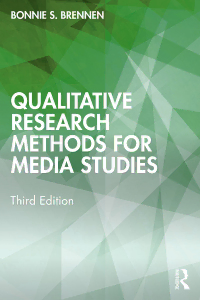
Qualitative Research Methods for Media Studies PDF
Preview Qualitative Research Methods for Media Studies
Cover Page: i Half Title Page: i Title Page Page: i Copyright Page Page: iii Contents Page: iv Chapter 1 Getting Started Page: vii Quantitative vs. Qualitative Research Page: 3 The Development of Qualitative Research Page: 5 Analyzing Evidence Page: 8 Conceptual Orientations Page: 9 Chapter 2 Doing Qualitative Research Page: 15 Common Qualitative and Quantitative Terms Page: 15 The Ethics of Qualitative Research Page: 18 The Qualitative Research Process Page: 21 Choosing a Research Topic Page: 21 Crafting Research Questions Page: 23 Gathering and Analyzing Evidence Page: 24 Using Big Data Page: 25 Crafting a Research Report Page: 27 Chapter 3 Interviewing Page: 30 Qualitative Interviews Page: 33 Ethical Considerations Page: 34 Using Qualitative Interviews Page: 35 Conceptualizing a Study Page: 36 Designing a Study Page: 36 Conducting Interviews Page: 37 Interviewing Techniques Page: 40 Transcribing Interviews Page: 43 Analyzing the Information Page: 44 Verifying Information Page: 45 Writing a Research Report Page: 45 Interviewing Exercises Page: 62 Chapter 4 Focus Groups Page: 66 The Development of Focus Groups Page: 69 Contemporary Focus Groups Page: 70 The Role of a Moderator Page: 71 Facilitators’ Communication Strategies Page: 72 Recruiting Participants Page: 75 Dealing With Difficult Participants Page: 78 Ethical Considerations Page: 79 The Focus Group Process Page: 80 Focus Group Research Page: 82 Focus Group Exercises Page: 99 Chapter 5 History Page: 103 Traditional vs. Cultural History Page: 105 Media History Page: 107 The Method of History Page: 109 Collecting Historical Evidence Page: 110 Types of Historical Materials Page: 112 Evaluating Historical Evidence Page: 113 Ethical Considerations Page: 116 Research Using History Page: 116 Historical Methods Exercises Page: 133 Chapter 6 Oral History Page: 136 Technique of Oral History Page: 139 Interview Strategies Page: 141 Learning to Listen Page: 144 The Editing Process Page: 146 Ethical Considerations Page: 148 Research Using Oral History Transcripts Page: 149 Oral History Exercises Page: 171 Chapter 7 Ethnography and Participant Observation Page: 173 Thick Description Page: 175 Ethnography in Media Studies Page: 176 Digital Ethnography Page: 177 Participant Observation Page: 182 Participant Observation Through Avatar Page: 182 Field Notes Page: 183 Reflexivity Page: 185 Analyzing and Interpreting Ethnographic Material Page: 186 Ethical Considerations Page: 187 Research Using Ethnography Page: 188 Participant Observation Exercises Page: 208 Chapter 8 Textual Analysis Page: 211 What Is a Text? Page: 213 The Development of Textual Analysis Page: 214 The Influence of Semiotics Page: 216 Multimodal Texts Page: 217 Theory and Interpretation Page: 218 Encoding and Decoding Page: 220 Ideological Analysis Page: 222 Genre Analysis Page: 224 Rhetorical Analysis Page: 226 Using New Technologies in Textual Analysis Page: 227 Ethical Considerations Page: 228 Research Using Textual Analysis Page: 229 Textual Analysis Exercises Page: 247 Acknowledgments Page: 251 Index Page: 253
Description: